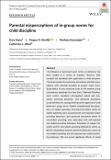Files in this item
Parental misperceptions of ingroup norms for child discipline
Item metadata
| dc.contributor.author | Ganz, Gary | |
| dc.contributor.author | Neville, Fergus Gilmour | |
| dc.contributor.author | Kassanjee, Reshma | |
| dc.contributor.author | Ward, Catherine | |
| dc.date.accessioned | 2020-05-27T14:30:01Z | |
| dc.date.available | 2020-05-27T14:30:01Z | |
| dc.date.issued | 2020-11 | |
| dc.identifier | 267797957 | |
| dc.identifier | 11cefe6a-f992-450a-b4bb-2edcae46c0e1 | |
| dc.identifier | 85085577847 | |
| dc.identifier | 000535602700001 | |
| dc.identifier.citation | Ganz , G , Neville , F G , Kassanjee , R & Ward , C 2020 , ' Parental misperceptions of ingroup norms for child discipline ' , Journal of Community and Applied Social Psychology , vol. 30 , no. 6 , pp. 628-644 . https://doi.org/10.1002/casp.2466 | en |
| dc.identifier.issn | 1052-9284 | |
| dc.identifier.other | ORCID: /0000-0001-7377-4507/work/74873219 | |
| dc.identifier.uri | https://hdl.handle.net/10023/20000 | |
| dc.description | This work is based on research supported in part by the National Research Foundation of South Africa (grants numbered IFR2011033100037 and IFR170206222035) and the Economic and Social Research Council (ES/N01068X/1). | en |
| dc.description.abstract | The influence of perceived social norms on behaviour has been studied in a variety of domains. However, little research has examined their application to child discipline. This study explored social norms perceptions and their associations with parental discipline in greater Cape Town, South Africa. A cross‐sectional study of 195 mothers (using convenience sampling) from two Early Childhood Development centres examined self‐reported violent and non‐violent parenting behaviour, and perceived descriptive (usual behaviour in a group) and injunctive (appraisal of such behaviour) group norms. Parents overestimated the prevalence of violent parenting. Perceived descriptive norms of violent parenting were associated with self‐reported violent parenting behaviour; and perceived descriptive norms of non‐violent parenting were associated with self‐reported non‐violent parenting behaviour. Estimation of support for violent and for non‐violent parenting differed by centre, as did the relationship between perceived injunctive norms of non‐violent parenting and self‐reported non‐violent parenting behaviour. We also found significant effects of social identification, parent educational attainment and parent‐reported child misbehaviour. Parents' perceptions of group norms of parental discipline may be mistaken yet influence their own behaviour, providing the potential basis for violence prevention interventions. | |
| dc.format.extent | 17 | |
| dc.format.extent | 1075075 | |
| dc.language.iso | eng | |
| dc.relation.ispartof | Journal of Community and Applied Social Psychology | en |
| dc.subject | Social norms | en |
| dc.subject | Child discipline | en |
| dc.subject | Parenting | en |
| dc.subject | Norms perception | en |
| dc.subject | BF Psychology | en |
| dc.subject | DAS | en |
| dc.subject | SDG 16 - Peace, Justice and Strong Institutions | en |
| dc.subject.lcc | BF | en |
| dc.title | Parental misperceptions of ingroup norms for child discipline | en |
| dc.type | Journal article | en |
| dc.contributor.sponsor | Economic & Social Research Council | en |
| dc.contributor.institution | University of St Andrews. School of Management | en |
| dc.contributor.institution | University of St Andrews. Public Health Group | en |
| dc.identifier.doi | https://doi.org/10.1002/casp.2466 | |
| dc.description.status | Peer reviewed | en |
| dc.identifier.grantnumber | ES/N01068X/1 | en |
This item appears in the following Collection(s)
Items in the St Andrews Research Repository are protected by copyright, with all rights reserved, unless otherwise indicated.

